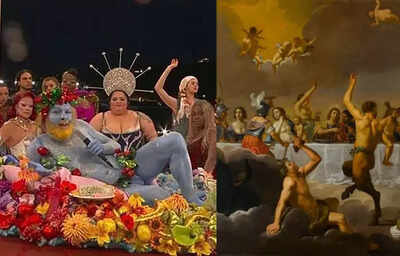
There is no Gospel account of Jesus’ attending a drag brunch.
But eating in community was a hallmark of Jesus’ ministry.
We know he attended a wedding that was so lively that the wine ran out.
And one of his post-Resurrection appearances found him cooking breakfast for the disciples.
So, I venture that if Jesus were alive today, he might have eaten overpriced eggs in a dive bar some morning among queer folks and friends.
And, if he did so, the criticisms would be very similar to those who attacked his actual ministry: “Look, he is a glutton and a drunkard, a friend of tax collectors and sinners.” (Luke 7:34)
Why does it matter whether Jesus would have dined with drag queens?
Over the weekend, some Catholic bishops charged organizers of the 2024 Olympics in Paris with mocking Christianity.
The source of their outrage was a vignette in Friday’s opening ceremonies which, allegedly, depicted Da Vinci’s “Last Supper”—but with drag queens and other campy figures.
I add “allegedly” because there was no direct reference to the painting, and some have even argued the performance depicted a banquet with the Greek god Dionysus.
I am not concerned about the performance’s depiction, but greatly concerned with how bishops have reacted.
The French bishops “deplore” the depiction, calling it “scenes of derision and mockery of Christianity.”
Malta’s Archbishop Charles Scicluna filed a formal complaint with his nation’s French ambassador. In the U.S., Crookston’s Bishop Andrew Cozzens called it “heinous” and Winona-Rochester’s Bishop Robert Barron condemned it as part of a “deeply secularist postmodern society” hostile to Christians.
Archbishop Vincenzo Paglia, president of the Pontifical Academy for Life, tweeted that “the mockery of the Last Supper at the #OlympicsParis2024 [was] rightly deplored by the [French bishops].”
I saw these criticisms on social media before viewing the actual performance. After watching a video online, I think that these church leaders are upset because the performance involved drag queens.
Somehow their participation, and organizers’ decision to mix religion and camp more broadly, mocks Christianity.
The simple presence of queer folks seems to be enough for outrage at times. Despite my attempts to understand the bishops’ argument from different perspectives, I am not sure there is more to it besides a simple distaste for queer culture, at best, or a dislike of LGBTQ+ people, at worst.
The root problem seems to be a lack of understanding about drag—its history, its meaning, and its value—on the prelates’ part. One of the performers, the French drag queen Piche, said as much:
“‘[‘The Last Supper’] has been reused in pop culture for decades and it’s never really been a problem. There were no real provocations or anything that was truly obscene. We didn’t make fun of the painting at all … it’s really just because it’s queers and drag queens who use that representation that it bothers.’”
The Olympics are, at least ideally, an opportunity to highlight cooperation and peace. But this controversy fails to do so because of some Catholics’ uninformed critiques.
The Olympics’ organizing committee has apologized for any offense caused.
Bishop Barron and others have rejected the apology and sustained their criticism.
There seems little that will be constructive emerging from the bishops’ reactions.
Archbishop Paglia did get one thing right in his tweet about the Olympics: “Everyone, absolutely everyone, wants to sit at the table where Jesus gives his life for all and teaches love.”
Jesus would eat with queer folks, even drag queens, today.
Perhaps to foster understanding, bishops should do so, too.
